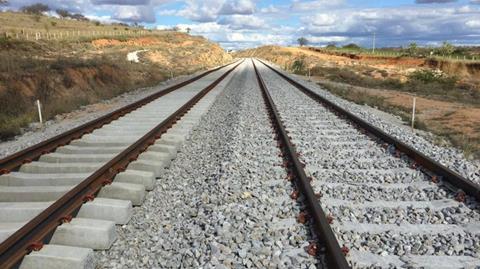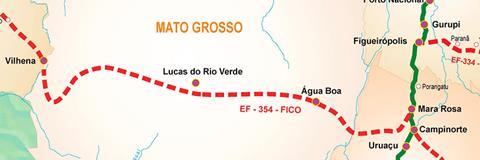
BRAZIL: Engineering company Valec is expected to start construction of the western arm of the Integration Railway (Ferrovia de Integraçao Centro-Oeste) in April 2021.
The date was agreed at a meeting in November between Valec President André Kuhn and Senator Wellington Fagundes, President of the Parliamentary Association for Logistics & Infrastructure. According to Davi Ferreira Gomes Barreto, Director General of the National Land Transport Agency ANTT, Valec’s contract is expected to be signed before the end of the year.
Due to be completed by 2026 at a cost of R2∙73bn, the 383 km FICO will run from Água Boa in Mato Grosso state to Mara Rosa in Goiás, where it will connect with the North-South Railway (Ferrovia Norte-Sul). There will be 10 crossing loops, together with loading terminals at Água Boa and Nova Crixás, plus a marshalling yard at Mara Rosa.
Intended primarily for hauling agricultural produce, the 1 600 mm gauge line is expected to handle 13 million tonnes of traffic in its first year of operation, It will serve the Araguaia valley in Mato Grosso, from where produce would be shipped east for export via the Norte-Sul to the ports of Santos in São Paulo state and Itaqui in Maranhão state.

In the longer term traffic could be routed via the eastern arm of the Integration Railway (Ferrovia de Integração Oeste-Leste), which is now partly under construction. FIOL is intended to link Figueirópolis on the Norte-Sul with the port of Ilhéus on the Atlantic coast.
The FICO project was granted a licence by the Brazilian Institute for the Environment & Renewable Natural Resources on September 29, paving the way for final approval and contract signing. The alignment was deemed not to pass through any conservation areas, nor to affect any protected land owned by indigenous communities. Nevertheless, the Institute has specified a series of obligations that cover flora and fauna, waste management, water quality monitoring, compensatory planting and fire prevention.
The next stage of the project would be to build westward from Água Boa towards Lucas do Rio Verde. The country’s long-term railway development strategy envisages that the line could eventually run for 1 640 km from Mara Rosa to Vilhena in Rondônia state.
Funding for FICO draws on a payment made by mining company Vale under a ‘cross-investment mechanism’ for early renewal of its concessions to operate the Vítoria-Minas Railway and the Carajás Railroad. Agreement to the concessions being extended from 2027 to 2057 was granted by the Federal Court of Accounts in July.

















